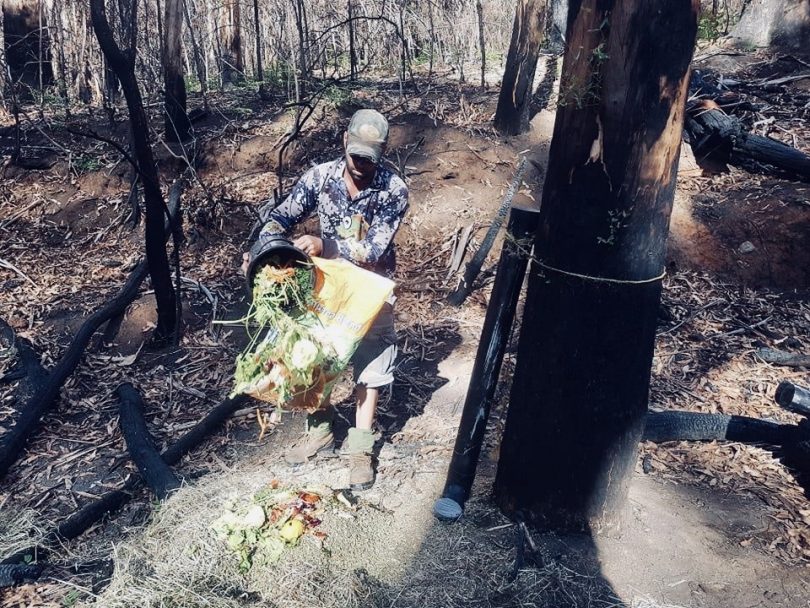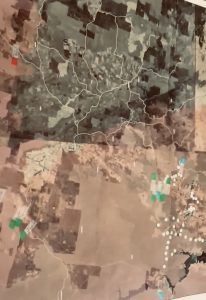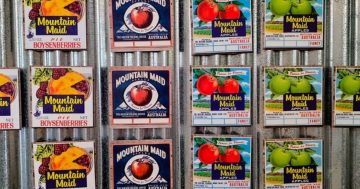
Wayne Dubois has singlehandedly set up hundreds of feed and water stations for fire-affected wildlife around Batlow. Photo: Supplied.
When Wayne Dubois finishes work, he fuels and packs his tiny Subaru Brumby ute and sets off on a 50-kilometre round trip through charred forests to feed wildlife.
Along the way, you’ll see him throwing apples out the window.
“I figure if I chuck the apples into the forest as far as I can, they’ll feed animals I can’t reach,” he said.
The Batlow native reckons he goes through 600 apples daily as he rotates between the hundreds of bushland food and water stations he’s singlehandedly established and resupplies every four days.
This has been his routine in the six weeks since bushfires annihilated around 600,000 hectares of farm and bushland in his backyard, south and west of Kosciusko National Park.
It was all over the news at the time: the mega-blaze that resulted from the convergence of the Dunns Road, East Ournie Creek and Green Valley fires.
The outcry at the animals lost to the fires peppered social media.
But Wayne says the greater tragedy is the failure to support those animals since.
“Those that survived the fires, I’d say most would have starved to death or died of thirst and if they’ve come through I’d hate to see the state they’re in,” he said.
Wayne says he’s no greenie, environmentalist or hippie, but he’s well known in fishing circles with 7500 Facebook followers on his Mr Freshwater page, a title earned through his knowledge of freshwater fishing (he has the tournament wins to prove it).
Forced to leave an “undefendable” Batlow at the height of the fires, in the six nights Wayne was away he saw hundreds of people step forward to help the beleaguered community.
“I said to my partner, ‘when we get back I’m going to give a hand to any wildlife groups that need it – there’s more than enough support for everyone else so let’s go help the wildlife'”, he explained.
That’s when he first discovered there was no help.
Fires sandwiched by two heatwaves had rendered most surviving wildlife in shock without food or water.
“Because I fish, I’m out in the bush every day. I know that bush like the back of my hand and, after the fires, to look at it, I knew what I had to do.
“I just thought I’ve got to at least get water up on top of the hills so the animals can get a belly full to make the trip downhill to the nearest water source,” Wayne said.
Water and food stations were established close to town and increasingly toward neighbouring Blowering Dam, refeeding trips ended with nights of researching wildlife habits and feed. Wedged between were fruit and vegie rounds of the local supermarkets or Wayne on his hands and knees in the orchard where he works filling plastic bags with apples that have been thinned out.

Part of a topographic map showing the tagged spots indicating wildlife feed and water stations established in the fire-affected area south and west of Kosciusko National Park.
He’s not alone. A topographic map indicates a handful of animal support sites from Batlow to the Victorian border, separated by massive tracts of blackened land.
“I was told by people in forestry that no animals would have survived that fire – that there’s nothing out there, but I can tell you there are animals out there, hundreds of them and a lot of them are babies.”
Then after the fires came the rain, which created rivers of ash.
Pleas for help via social media, email, letters, phone calls to local council, politicians, forestry corporations and wildlife groups went unanswered.
“I started out feeling compelled to help, now I feel obligated because if I don’t go out there nobody else will and the bloody things will starve to death,” he said.
Relief, or so he thought, arrived three weeks ago in the form of one well-known wildlife organisation. But their assistance is contingent on Wayne buying trail cams to prove the number of animals.
“If there’s one animal out there that should be enough to warrant your support but I know there’s hundreds of animals relying on me,” he said.
But there’s high praise for the assistance from fishing fans who donated 1.5 pallets of bird feed and the Animal Rescue Cooperative (ARC) who are consistently supporting Wayne’s efforts.
“The fires might be out but it’s our responsibility to ensure these fire-affected areas are supported and rehabilitated – the wildlife losses are still occurring and it’s inhumane to continually turn a blind eye,” he said.
To Wayne’s work, visit Mr Freshwater on Facebook.
To make support ARC’s work, visit the Animal Rescue Cooperative.








